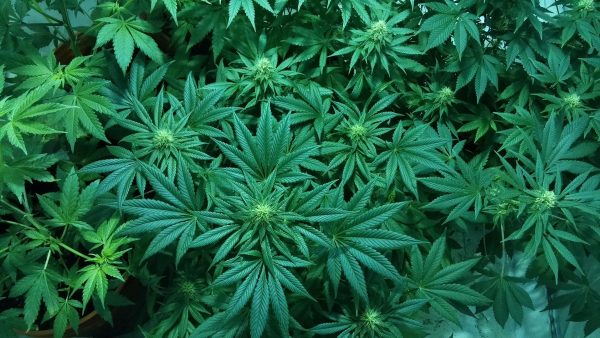Barely Legal: Some officials in Alabama want to outlaw delta-8. Others want to make it safer
Delta-8 is poorly understood and unregulated. Yet, the sale of this processed form of cannabis is currently legal in Alabama.
Supporters say it has medicinal uses and can be safe even when used to get high. Critics, echoing past comments about its cannabis cousin, marijuana, say it’s dangerous and should be outlawed.
What’s what
Before we get into the “weeds” of this story, a few definitions:
Delta-8 is a product derived from the hemp plant that’s synthesized to create concentrated levels of THC. THC is the psychoactive compound that’s also found in marijuana, but at naturally high levels. Hemp and marijuana are both subspecies of Cannabis sativa L.
Neil Fetner, the deputy chief of police in Lincoln, Alabama, explained the relationship between hemp and marijuana this way.
“Smells the same, looks the same,” Fetner said. “The only thing is how much THC is in that product. Hemp is the lesser of that type of a plant, and the marijuana is the more potent.”
Why is the sale of delta-8 legal?
That low THC content is why hemp can now be grown legally under federal law. And while that law doesn’t make delta-8 products legal, it doesn’t make them illegal.
That’s why they can be sold in many states, including Alabama, to people over 21 years of age — except in Lincoln. To the best of Fetner’s knowledge, the city, about 45 minutes east of Birmingham, appears to be the only municipality in the state to outlaw it.
“The local ordinance here was designed to combat issues that we were having with products that are not regulated by the FDA or any governmental agency,” Fetner said.
Lack of oversight
It’s that lack of regulation, say critics, even some proponents, of delta-8, that leaves the consumer in jeopardy.
“A lot of times they don’t know what they’re getting. And that’s dangerous,” Fetner said.
That lack of oversight and quality control allows for products that could have random degrees of potency and unsafe ingredients.
“There’s no regulation or degree of enforcement [in] detecting any of those impurities,” said Stacy Marshall. She’s an emergency room doctor at UAB and a medical toxicologist for the Alabama Poison Information Center (APIC).
She noted there’s little research into the effects that delta-8 — as well as cannabis, more generally — have on consumers.
“Take two adults, they eat the same amount … One person experiences, like, your kind of typical high … But there’s a subset of the population that will take, a ‘normal amount,’ and then it’ll precipitate these more severe psychotic features,” Marshall said.
Marshall said she regularly sees patients, including children, who have had bad reactions to delta-8. APIC says they saw about 250 calls last year, as well as this year, related to the drug.
None of those negative effects have directly led to fatalities, but symptoms can include paranoia, hallucinations and elevated heart rate. In some cases, the effects are long-lasting. Also, children sometimes get into the products, because they look like candy.
Fetner said the hallucinations can be extreme and can differ significantly from marijuana.
“I’ve never seen anybody in 20 something years in law enforcement that smoked weed that described it to me like they were on fire,” Fetner said.
He explained one person had consumed what was believed to be delta-8 and ended up running down a local roadway, naked.
Delta-8 could be safer, like corn syrup
Cassin Coleman is an organic chemist with the National Cannabis Industry Association. Even she has concerns about delta-8.
“Some of the chemicals used to do these things are quite dangerous,” she said. “I think that’s probably the thing that always concerns me the most, as a scientist.”
But, Coleman explained, the process used to make delta-8 more potent is not necessarily some back-alley, sketchy procedure. By definition, it’s the same used to synthesize products, such as over-the-counter pain-relief medications and corn syrup.
“There are a lot of products that I think we use every day that go through similar processes, but they also have guiderails,” Coleman said.
That’s the rub. Delta-8 products could be safer if they were regulated. Already, according to Coleman, some producers do follow strict quality-control measures. After all, they want return customers.
And consumers want, and in some cases need, products with THC.
Coleman got into the study of cannabis, after her wife was diagnosed with multiple sclerosis. Coleman said products derived from the plant help MS patients, as well as people with other diseases and conditions.
“I don’t think it’s possible to fix the issues causing consumers to need the products,” Coleman said. “But we can fix having rules to make it so that consumers can be confident in buying these products, just like they are and buying Tylenol or corn flakes.”
For almost a century, Coleman explained, the vast majority of scientists have been prevented from doing research on cannabis, both hemp and marijuana, due to what many call misguided policy.
“We have as a planet, fallen behind on the understanding of one of the most versatile plants that has ever been on the planet,” she said. “I mean, at the same time that we were figuring out how to make hundreds of products from corn, we could have been figuring out how to make hundreds of products from Cannabis sativa L.”
It’s simple, according to Coleman. Instead of treating the plant as a pariah, treat it as an opportunity.
Parents, are you sure your kid’s car seat is installed right? Here’s how to know
In this visual guide, certified car seat experts walk through common installation mistakes and how to fix them. Learn what a secure car seat base and a tightly fastened tether look like and more.
Trump announces ‘major combat operations’ in Iran
Israel and the U.S. have launched strikes against Iran, with explosions reported in Tehran and air raid sirens sounding across Israel.
Trump says he is ‘not happy’ with the Iran nuclear talks but indicates he’ll give them more time
U.S. President Donald Trump said Friday he's "not happy" with the latest talks over Iran's nuclear program but indicated he would give negotiators more time to reach a deal to avert another war in the Middle East.
Bill Clinton says he ‘did nothing wrong’ with Epstein as he faced grilling over their relationship
Former President Bill Clinton told members of Congress on Friday that he "did nothing wrong" in his relationship with Jeffrey Epstein and saw no signs of Epstein's sexual abuse as he faced hours of grilling from lawmakers over his connections to the disgraced financier from more than two decades ago.
How the federal government is painting immigrants as criminals on social media
Experts say this kind of media campaign is unprecedented and paints a distorted picture of immigrants and crime
Pentagon puts Scouts ‘on notice’ over DEI and girl-centered policies
After threatening to sever ties with the organization formerly known as the Boy Scouts, Defense Secretary Hegseth announced a 6-month reprieve








